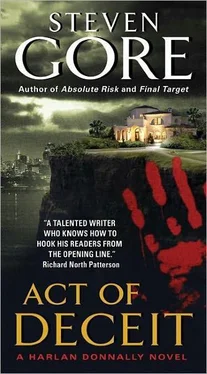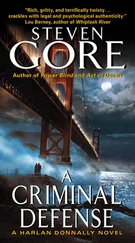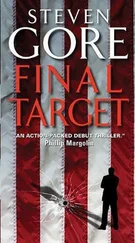Steven Gore - Act of Deceit
Здесь есть возможность читать онлайн «Steven Gore - Act of Deceit» весь текст электронной книги совершенно бесплатно (целиком полную версию без сокращений). В некоторых случаях можно слушать аудио, скачать через торрент в формате fb2 и присутствует краткое содержание. Жанр: Триллер, на английском языке. Описание произведения, (предисловие) а так же отзывы посетителей доступны на портале библиотеки ЛибКат.
- Название:Act of Deceit
- Автор:
- Жанр:
- Год:неизвестен
- ISBN:нет данных
- Рейтинг книги:5 / 5. Голосов: 1
-
Избранное:Добавить в избранное
- Отзывы:
-
Ваша оценка:
- 100
- 1
- 2
- 3
- 4
- 5
Act of Deceit: краткое содержание, описание и аннотация
Предлагаем к чтению аннотацию, описание, краткое содержание или предисловие (зависит от того, что написал сам автор книги «Act of Deceit»). Если вы не нашли необходимую информацию о книге — напишите в комментариях, мы постараемся отыскать её.
Act of Deceit — читать онлайн бесплатно полную книгу (весь текст) целиком
Ниже представлен текст книги, разбитый по страницам. Система сохранения места последней прочитанной страницы, позволяет с удобством читать онлайн бесплатно книгу «Act of Deceit», без необходимости каждый раз заново искать на чём Вы остановились. Поставьте закладку, и сможете в любой момент перейти на страницу, на которой закончили чтение.
Интервал:
Закладка:
“But you won’t be finishing out your days here, but in a hell on earth. A prison cell.”
“Are you intellectually deaf or just not listening?”
“There’s no statute of limitations on murder.”
Hale snorted again. “Anyone who could tie me to any of the murders is dead. At most you have a circumstantial case. I may be the man with the last word, but there’s no one alive who heard me speak it. The dead, my friend, are both deaf and mute. The most you could possibly have is hearsay.”
Donnally extracted his tape recorder from his jacket pocket and set it on the table between them. He left his gun exposed.
“A confession?” Hale smiled. “You expect me to confess? You’re insane.” Hale reached for the bell. “I think I’ve had enough of this.”
Donnally didn’t interfere. Instead he turned on the recorder. The voice was a whisper:
This is the dying declaration of William Sherwyn.
Hale’s eyes widened for just a second, then he looked at Donnally. “It doesn’t make any difference what he said. It’s all hearsay.”
“You should’ve studied up for a day like this,” Donnally said. “A dying declaration is the exception to the hearsay rule.”
El Mandamas is Albert Hale. He established White Sands.
Hale glanced over his shoulder at the sound of the door opening behind him. He grabbed the recorder and fumbled with it, jabbing at buttons.
I was present in Hale’s house when he gave Gregorio Cruz ten thousand dollars in cash and ordered him to kill Harlan Donnally.
Hale wrapped his hands around the device, muffling the sound, then thrust it toward Donnally.
“Turn this damn thing off.”
Donnally took it from him.
When Anna Keenan threatened to expose us, I had no choice but to-
Donnally pressed the “off” button.
The butler came to a stop next to Hale, who looked up and waved him away.
Hale waited until the butler was out of hearing range. His face was flushed and sweating.
“What do you want? A payoff? Is that what this is, extortion?”
“It would more properly be called blackmail,” Donnally said, smiling. “Extortion relies on a threat of violence. Blackmail on a threat of exposure or, in this case, of dying an excruciating death in a prison hospital.” Donnally paused for a moment. “It’s interesting. Sherwyn didn’t make that mistake. He called it by its correct name when I offered him what he thought was a chance to buy his way out.”
“So this was about money all along.” Hale forced a smirk, attempting to conceal his vulnerability behind a wall of sarcasm. “So that maybe you can buy a new stove for your little cafe? Perhaps add some outdoor seating? Maybe a mosquito zapper?”
“Actually, I’ve decided on a new career.”
Donnally extended his hands before him, mimicking Hale’s earlier examination of his manicured nails.
“I think I’ve flipped enough burgers for a while,” Donnally said. “I’m looking for something that would be more satisfying, something that will allow me to make a more substantial contribution to the world.”
Hale swallowed and licked his dry lips. “And that would be?”
Donnally reached into his jacket and pulled out a power of attorney and held it up so Hale could read the title.
“I’ve decided to become the head of what used to be called the Albert Hale Foundation.”
Hale shuddered as the implication of Donnally’s demand blasted through the brick and mortar of his psychological defenses.
“Don’t worry,” Donnally said, handing him the two-page document and a pen. “I won’t let you starve. I may even let you stay here.”
Hale accepted it. His body hunched as though he thought the mansion was about to collapse over him. His hands vibrated too hard for him to focus on the words.
“I’ll… I’ll need to have my lawyer look at this.”
“There are two problems with that,” Donnally said. “First, your lawyer is the one that drafted it. And second, if you hire another one, you better make it a specialist in criminal defense.”
Donnally pulled out his cell phone. He punched in a number, waited a few moments, then said, “This is Harlan Donnally, let me speak to Lieutenant Navarro.”
“Give me a minute,” Hale said, his face reddening around the crimson splotches of his disease. “You can’t expect…”
Donnally reached for the recorder and held it up to the phone.
Hale threw up his palm. “Stop.” He signed on the last page.
Donnally disconnected and took the pages back.
“You’ll never get away with this,” Hale said, intending the words to sound like a threat, but they came out like a whimper.
Donnally rose to his feet without answering, but before he could take a step, Hale reached out into the emptiness around him and asked, “What did you mean, ‘used to be called the Albert Hale Foundation’?”
Donnally displayed the power of attorney toward Hale.
“Read the fine print.”
Hale grabbed for it, but Donnally pulled it away. Hale bit on his knuckle as he skimmed down the text, then squinted at the last paragraph.
Donnally let him finish reading it, then turned toward the side gate leading to the driveway.
“Wait,” Hale said. “I still don’t understand. Who is Mauricio Quintero?”
Donnally stopped. Images of Mauricio clicked through his mind like falling dominoes, ending with the little man’s lifeless body in the Mount Shasta hospital, his sad brown face framed by the starched pillow, his handwritten confession lying in a drawer next to him.
Who Mauricio Quintero had been was the question that started Donnally on the trail that had brought him to this spot. And in understanding Anna’s life and death he’d found an answer, but it wasn’t one Hale had the right to hear, much less one he’d understand.
Donnally started walking toward the street and the declining sun that would soon abandon Hale to an empty twilight, and then said over his shoulder:
“Let’s just say he was a friend who asked me to deliver a letter.”
Note to the Reader
The idea for the story told in Act of Deceit arose out of a number of events.
In 1986 an individual I will identify as X walked into a furniture store in California and stabbed a clerk. He fled, leaving the broken blade in her body. X was arrested, charged with attempted murder, and sent for psychiatric treatment. After X completed counseling, the district attorney moved the Superior Court to dismiss the charges, which it did.
A year later he slashed his next-door neighbor to death.
On the motion of the public defender, X was sent under 1368 of the California Penal Code for an evaluation of his competence to stand trial for the homicide. He was found to be both mentally ill and developmentally disabled. He was returned to court a year later and was again found to be incompetent.
Since that time, no court has made a determination on whether X has recovered his competence to stand trial. Indeed, for more than a decade the Superior Court had not received a report of his mental condition. The most recent report I found in his court file concerned another defendant altogether.
This all came to light a couple of years ago when a friend of mine, who had spent his career working in the mental health field, reminded me of the concerns he had back in 1988 that X was pretending to be mentally ill, malingering, in order to avoid trial for the homicide. Indeed, the head psychiatrist at the out-patient facility that X was attending at the time of the crime had warned the staff prior to the murder that X was not mentally ill, but was a sociopath who was a danger to others at the facility.
My friend’s more general complaint was that since so many sociopaths claim mental illness to excuse their crimes, the public has come to believe that the mentally ill are more dangerous than everyone else. And this is not, in fact, the case.
Читать дальшеИнтервал:
Закладка:
Похожие книги на «Act of Deceit»
Представляем Вашему вниманию похожие книги на «Act of Deceit» списком для выбора. Мы отобрали схожую по названию и смыслу литературу в надежде предоставить читателям больше вариантов отыскать новые, интересные, ещё непрочитанные произведения.
Обсуждение, отзывы о книге «Act of Deceit» и просто собственные мнения читателей. Оставьте ваши комментарии, напишите, что Вы думаете о произведении, его смысле или главных героях. Укажите что конкретно понравилось, а что нет, и почему Вы так считаете.












